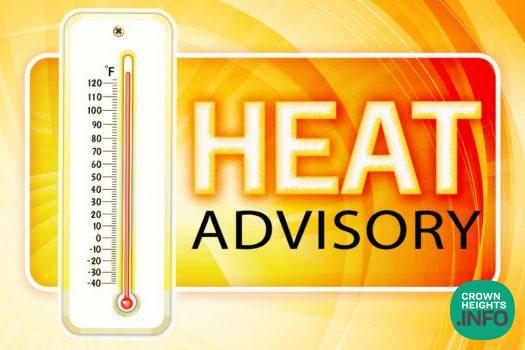
Weather: Flood Watch Today, Extreme Heat Tomorrow
The New York City Emergency Management Department and the Department of Health and Mental Hygiene are urging New Yorkers to take precautions ahead of a multi-day stretch of hot and humid weather.
According to the National Weather Service, heat index values on Tuesday are forecast to reach levels near 95°F. Confidence is higher for sustained heat indices between 95°F and 100°F from Wednesday through Friday, when a Heat Advisory is likely. Relief is expected by the weekend as a cold front moves through the region.
There is also a Flood Watch in effect for the City on Monday, with the potential for heavy rain and localized flash flooding in the afternoon and evening. City agencies are actively coordinating to monitor conditions and respond as needed. Flash floods can fill streets, stairwells, and basements in minutes, often with little or no warning. New Yorkers who live in basements, below-grade dwellings, or low-lying areas should take extra precautions: keep a Go Bag near the door, clear exits, and plan to leave early if conditions worsen.
“We’re looking at several days of intense heat, and now is the time to prepare,” said New York City Mayor Eric Adams. “Cooling Centers are opening citywide, and resources are available to help New Yorkers stay safe. If you live in a hot apartment or don’t have air conditioning, make a plan today. Drink water, avoid outdoor activity during the hottest hours, and don’t wait to seek help if you’re feeling lightheaded or ill. We’re also asking everyone to do their part to conserve energy. Set your air conditioner to the highest comfortable temperature and limit use of large appliances during peak hours. We’re mobilizing every resource to protect our city and get through this heat wave safely.”
“These high temperatures call for extra awareness and simple steps that can make a big difference,” said NYC Emergency Management Commissioner Zach Iscol. “We’re working closely with the National Weather Service, city agencies, and community partners to monitor conditions and respond as needed. Cooling Centers are open, but they’re just one option. Many public and private spaces offer safe, air-conditioned places to stay cool. If you don’t have A/C, make a plan now. Check on neighbors, especially older adults and people with medical needs. And help reduce strain on the grid by conserving energy during peak hours. This is a citywide effort, and every action counts.”
“The NYC Health Department’s preliminary data shows that there were at least 12 heat-stress deaths associated with the June heat wave, more than double the number we usually see in a summer, said Acting NYC Health Commissioner Dr. Michelle Morse. “Keeping cool during hot weather is not just for comfort – heat can kill. As our city faces more dangerously hot weather, we encourage those without access to air conditioning in their homes to utilize Cooling Centers or other cooling options nearby by such as a library or shopping mall. We also encourage New Yorkers to check on their neighbors and loved ones, especially if they are at risk. New Yorkers who must be outside should seek shade, take frequent breaks, and stay hydrated.”
New Yorkers are urged to take steps to protect themselves and help others who may be at increased risk from the heat. For more information, including heat-related health tips and warning signs of heat illness, visit NYC.gov/health or NYC.gov/beattheheat. In New York City, most heat-related deaths occur after exposure to heat in homes without air conditioners. Air conditioning is the best way to stay safe and healthy when it is hot outside, but some people at risk of heat illness do not have or do not turn on an air conditioner.
NYC Emergency Management has activated the City’s Heat Emergency Plan in response to this extreme heat event. The plan brings together agencies across the city to protect New Yorkers from heat-related risks. Key actions include opening NYC Cooling Centers, expanding outreach to people experiencing homelessness, increasing public information efforts, and monitoring health impacts in real time. Agencies are also identifying and assisting residents at highest risk, including older adults and people with chronic health conditions, through coordinated outreach and targeted alerts using the City’s Advanced Warning System (AWS). The plan also strengthens coordination with utilities, healthcare providers, and community organizations to reduce risks and protect public health during extreme heat.














